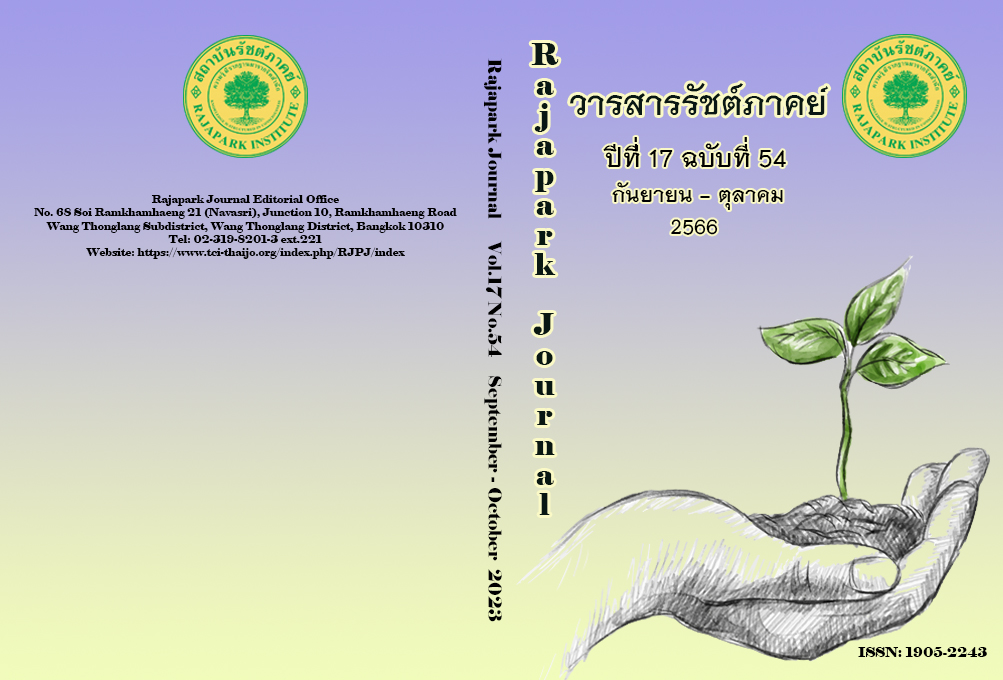Effect of Learning Management in Physical Education Using Simulation Approach on Learning Achievement in Badminton of Grade 10 Students
Main Article Content
Abstract
This research aimed to study the effects of learning management in physical education using the simulation approach on badminton learning achievement among Grade 10 students. The sample consisted of two classrooms of Grade 10 students at Suankularb Wittayalai Thonburi School. They were selected by using simple cluster or area sampling, after which the cluster selection method was used with specific examples or purposeful selection. The instrument for collecting data was lesson plans on physical education learning management with simulation, badminton skills, and achievement measures. The analysis of the data was done by average standard deviation and tested for differences with t-values. The research results were found as follows: 1) The mean sum of the badminton skill test scores of the experimental group posttest of the experiment was higher than the pretest, with a statistical significance of.05; 2) The mean sum of badminton skills between the experimental group and the control group showed that the experimental group was higher than the control group, with a statistical significance of .05. 3) The mean achievement in the badminton posttest of the experimental group was higher than the control group, with a statistical significance of .05.
Article Details

This work is licensed under a Creative Commons Attribution-NonCommercial-NoDerivatives 4.0 International License.
Views and opinions appearing in the Journal it is the responsibility of the author of the article, and does not constitute the view and responsibility of the editorial team.
References
Boonchuwong, Y. (2013). Teaching by Using Simulations. www.pharmacy.cmiJ.ac.th/unit_files/files.56-new.doc
Chan-Em, S. (2013). Developmental Psychology. Thai Wattana Panich.
Good, C. V. (1959). Dictionary of Education (2nd ed.). McGraw-Hill.
Holden, S. (1981). Dream in Language Teaching. Longman.
Khaemmanee, T. (2009). 14 Teaching Methods for Professional Teachers. Chulalongkorn University.
Kongpolprom, W., & Choosakul, C. (2020). The Factors and the Designs of Badminton Players Performance. Academic Journal of Thailand National Sports University, 12(3), 253-266.
Kunaphisit, W. (2018). Curriculum and Learning Management of Physical Education (Revised). Academic Promotion Center.
Ministry of Education. (2008). Basic Education Core Curriculum, 2008. Agricultural Co-Operative Federation of Thailand.
Moonkham, S., & Moonkham, O. (2009). 19 Learning Management Methods: To Develop Knowledge and Skills. Parbpim.
Norkaew, D. (2015). Simulation-Based Learning for Nursing Education. Journal of Boromarajonani College of Nursing, Bangkok, 31(3), 112-122.
Pianchob, W. (2018). Collection of Articles on Philosophy, Principles, Teaching Methods, and Measurements for Physical Education Evaluation. Chulalongkorn University.
Phosuwan, C. (2001). Adult Education: Western Philosophy and Practice. Kasetsart University.
Phothawin, T. (2016). Adolescent Development. Sukhothai Thammathirat Open University.
Pornkul, C. (2011). Teaching Thinking Process, Theory and Application (2nd ed.). Chulalongkorn University.
Suksai, P. (2018). Physical Education Teacher in the 21st Century. FEU Academic Review, 12, (Supplement), 8-21.
Thanaroj, S. (2017). Simulation-based Learning in Principles and Techniques Course in Nursing Practicum. Boromarajonani College of Nursing, Uttaradit Journal, 9(2), 70-84.
Wongpanom, J. (2019). Development of Ability to Play Football Using Simulation for High School Student Athletes[Master's thesis, Dhurakij Pundit University].


